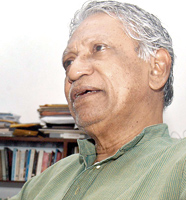The Cinema should be free; Dr. Pathiraja
Dr. Dharmasena Pathiraja is a teacher of cinema and a visionary filmmaker who foresaw country’s political, economical and social changes. Right throughout his four decade film career he stood firm and acted independently without falling into any political powers and pressure.

Dr. Dharmasena Pathiraja Pix by Nilan Maligaspe
Started with ‘Ahas Gauwa’ (One League Of Sky) his first feature film in 1974 in which he dealt with the urban lower class, Pathiraja was a revolutionary in Sri Lankan cinema.
Always voiced for the goodwill of cinema and the right of the filmmakers, Dr. Pathiraja spoke to the TV Times about his newest film ‘Swaroopa’ (Self Image), a story based on world renowned Franz Kafka’s story ‘Metamorphosis’ and problems faced by Sri Lankan cinema.
Q: Can you tell about your new film?
At the first look Kafka’s book was an unadoptable story. It was a kind of a literature itself.
It’s story about where the protagonist one day changed to a giant insect. I asked from the script writer, Eric Illayapparachchi one of the finest writers how could we do this as the adaptation was a difficult task. Anyhow we made it to a periodic film that runs from 1920s to late 1950s.
Q: What impact this film would have on the present society?
According to the story the main character is a pharmaceutical salesman. When we were writnig the script, we were reflecting on what Professor Senaka Bibile tried to do in Sri Lanka. We thought of bringing out issues related to drug trade. The main character in the story is a victim of drug trade and competition. We think that with tie and coat these people are very happy but the truth is they are a suffering lot.
Q: With your experience what is the biggest problems the industry facing right now?

Franz Kafka
The country must quickly change to digital cinema. We are wasting a lot of money because of the old system. The government must face this challenge and face the natural transformation. There is a kind of nostaligia and we also did not like the death of celluloid. But we have to accept the reality.
The country quickly needs some digital theatres and these should not be massive theatres but mini-theatres. The best option is multiple cinema complexes .
Q: During the recent history we have seen different authorities interfering with the artistes and their creative works and the latest of these trends was ‘Flying Fish’ made by young filmmaker Sanjeewa Pushpakumara. You being one of the pioneer filmmakers in the country how do you describe this trend?
It is a pity that these kind of things are happening. The Censor Board or Public Performance Board has been established by a Parliamentary Act and they are the people who can judge a film whether it is good or bad. This has nothing to do with the Defence Ministry. Now they say that this post-war problems are very complex. So artiste are is not there to artificially exaggerate government’s ideology. So now these people think that this is damaging the image of the country. But what is the image we have nationally or internationally about the government or the state. It has already been damaged. So internationally it is well-known that this is now a country going away from democracy. Everybody knows this and these are things that are deep within our society.
Artistes are people who does their creation with a vision and they should be free. Now we don’t have freedom to talk and freedom to discuss. They want the artistes to go with the government’s ideology and they want the filmmakers to do propaganda films. So they want films with nationalistic views. This really damages the film industry and film as an art.
Q:How do you see these kind of censoring by governmental authorities?
I am totally opposing these kinds of action and taking upper hand in deciding on the art and cinema. How come the Defence Ministry interfere with cinema. It should be by the Cultural Minister or the Media Ministry. This first happened to Prasanna Vithanage’s ‘Purahanda Kaluwara’ then Asoka Handagama’s ‘Aksaraya’ and there were lot of criticism came against Vimukthi Jayasundara’s film and then finally Sanjeewa Pushpakumara’s ‘Flying Fish’. So I totally disagree with this kind of recensoring. This has nothing to do with art.
I don’t think we even need a Censor Board. But anyway it doesn’t matter since there is a tradition we have to follow. Anyway there is self-censorship in our cinema.
There is lot of support and sponsorship by the state for this kind of cinema because it helps them to develop this national Sinhala Buddhist ideology. That is good for their ‘Manapa Electoral system’.
Q: Have you found this type of interference by governmental authorities in other countries too?
I don’t think under these circumstances. There are films banned for other reasons but they are by authorities relating to Censor not by government. In countries like Australia there is no Censor Board. They are called ‘Clarification Board’. They have to clarify the film. They have to rate the film like more suitable for adults and so on. If a film is catagoised for adults let the adult see it. But
Q: There was a huge controversy over Filmmakers Guild’s demand to limit the number of copies of a film to 35 but certain films has now gone beyond this limitation. What made the Filmmakers to demand for such limitatinos?
We have only 155 theatres in the country. If one producer is releasing 55 copies it is unfair. They are taking their films to other circuits also. For example if you are releasing on EAP circuit they have to take to the other circuit also to release the target number of copies. If in case these films ar screened for 100 days what will be the fate of the other filmmakers. They say this is good for the survival of the industry. It is not a survival for the industry, it is for the survival of the producers. This is damaging the industry because other people have to wait years and years to release their films. If we have around 400 to 500 theaters in this country this would not be a problem.
Q:What are the long term effect of this and how does these things are happening?
This affects badly on the filmmakers from the younger generation. Those who release a large number of copies blocks the chances of younger generation. With 35 copies some law-budget films can survive. These people say they spend over Rs 100 million. But what I think is there are a lot of corruptions going on in this system by the producers. On the other hand the theatre owners also like to release this type of fantasy films. This is an insult to cinema are pageants and artificial spectacles.
Q: Now we have come out of a three decade long war during which the cinema industry also suffered with the destruction of theatres. Can Sri Lankan cinema be used for reconciliation?
I was thinking about doing a film. But in this setting you can’t do a film on reconciliation. That type of films we do would not be allowed. You can’t do films about displaced people. What they want is to glorify humanitarian operations. War can never be a humanitarian operation. There is nothing humanitarian in war. So people suffer due to war. With what is happening in North right now I don’t think any filmmaker can do any film. They want to glorify the war. Not a filmmaker like us even a Tamil filmmaker will not be allowed to do any film.
Q:Despite various hardship and bleak future, the younger generation seemed to be attracted to cinema and they want to take up filmmaking. How do you view these positive trends ?
I am teaching at the University of Moratuwa I know there are lot of young filmamkers who wanted to come out. They are really interested in this art. The courage the younger generation has and what is happening in the society they like to discuss these things with the people through cinema and what kind of a society we are living. That kind of provocation is there. But that would not happen unless the government and this regime does not change their attitude towards art.
Team of ‘Swaroopa’
Cast: W. jayasiri, Nita Fernando, Thusitha Laknath, Reeni de Silva, Daya Tennakone, Wimal Kumara de Costa, Lakshman Mendis, Vishvajith Gunasekara and D. B. Gangodatenna.
Camera: Donald Karunarathna
Editor: Elmo Halide
Music: Nadeeka Guruge
Follow @timesonlinelk
comments powered by Disqus


